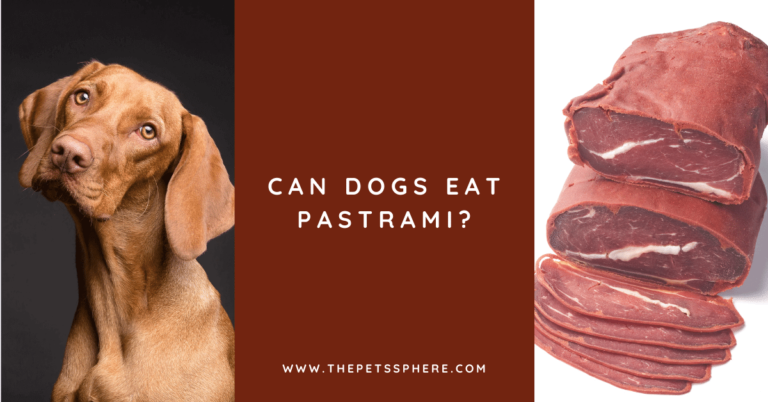Pastrami is super delicious, and we love adding it to sandwiches. Often, we might want to share some with our doggos too. Well, we do know that our pups also love meat but can dogs eat pastrami without any problem?
No, dogs cannot eat pastrami as it contains spices like garlic along with high salt and fat content, which is a lethal combination for dogs.
So, while your dog might be waiting for you to offer it some pastrami with its big puppy eyes, you need to consider several factors that will help keep your dog safe.
What to do if my dog ate pastrami?
If your dog has eaten a small amount of pastrami, you do not need to panic. Even though pastrami is not good for dogs, a little bit won’t do any harm. But if the pup has consumed a large amount, call the vet right away. Keep your dog hydrated in the meantime.
In such cases, the two most important factors to consider are the dog size and breed. Small dog breeds cannot digest harmful foods without having some side effects. With that said, if your dog has eaten something that is bound to be toxic, you should closely monitor it for vomiting and diarrhea.
In addition to that, if you notice that your dog reacts strangely to certain food items, you should immediately stop giving it the said item. At most, your dog will experience a few spells of vomiting and diarrhea. However, if the vomiting is severe, you will need to consult your vet.
Can dogs eat packaged pastrami?
Dogs should not eat packaged pastrami as packaged food items tend to contain more preservatives. Packaged sandwich meats are not only processed but also loaded with salts to increase their shelf life. Therefore, the high sodium content makes packaged food items a poor choice for your dog.
At the same time, dogs tend to be quite sensitive to sodium and might experience sodium poisoning as well if exposed to too much salt. And when it comes to packaged pastrami, there are a lot of other spices used, such as paprika and garlic, to enhance its flavor.
If your dog often eats packaged pastrami, it will suffer from gastrointestinal issues in the long run. This is why you should do your dog a favor and keep such food items away to prevent serious health concerns.
Can dogs eat turkey pastrami?
No, dogs should not eat turkey pastrami. Similar to beef pastrami, turkey pastrami is loaded with spices like paprika and garlic that can be harmful to your dog. Even though turkey pastrami is lower in fat compared to beef pastrami, it still contains preservatives and sodium since it is made using the same process.
Can dogs eat homemade pastrami?
Yes, dogs can eat pastrami made at home using all the friendly ingredients.
To make pastrami at home:
- Boil a large pot of water and add ½ cup beef stock, ¼ teaspoon garlic powder, 1 teaspoon black pepper, and 1 tablespoon salt.
- Once the liquid has come to boiling, add 2 cups of pasta or rice for every pound you wish to cook.
- Cook until tender but not mushy.
- Then, add the meats in small chunks and simmer on low heat for 5 to 10 minutes with the lid ajar.
- Next, add 1 tablespoon of brown sugar and 2 tablespoons of apple cider vinegar per pound you are cooking.
- Return the lid and turn the heat to medium.
- Let it boil until the liquid has evaporated.
- Finally, allow the dish to cool before serving.
How to avoid accidental consumption of pastrami?
Perhaps the best way to avoid accidental consumption of pastrami and other potentially toxic foods is to practice proper food storage. Dogs will love to eat almost anything they are offered, but you need to be mindful of the food you are leaving out.
Larger dog breeds will try everything they can to grab and steal food items from the kitchen or the dining table. This is why you shouldn’t leave your food unattended while the dog is nearby. Plus, always make sure that the food is stored in a safe and secure place that is not accessible by your dog.
Related FAQs to whether dogs can eat pastrami
Can dogs eat salami?
No, dogs should not eat salami. It has high sodium and fat content, which is dangerous for dogs and can cause salt poisoning or pancreatitis.
What meats can dogs eat?
Dogs can eat lean ground beef, chicken, turkey, and chuck steak or roast. These are animal-based proteins that promote growth in dogs. However, before feeding them to your dog, make sure there are no preservatives or spices in them that might affect your dog’s health.
What happens if a dog eats deli meat?
You should avoid cold cuts or lunch meats as they are bad for dogs. Although lunch meat is usually safe if consumed in small amounts but processed deli meats such as pastrami contain sodium and harmful additives that could lead to digestive and kidney problems.
What meat dogs should never eat?
Meats such as bacon grease, bacon, ham, and fat trimmed off bones or meat tend to contain a lot of fat and salt that can lead to vomiting, indigestion, and diarrhea in dogs. In the worst-case scenario, it can also lead to the inflammation of the pancreas, which is a potentially deadly situation.
Final thoughts on whether dogs can eat pastrami
Your dog’s diet should be balanced and contain healthy minerals and vitamins that will help improve its overall health. Instead of experimenting with food items that can be dangerous, you shouldn’t take any chances and opt for healthier alternatives. Offering pastrami and other similar food items may seem like a good idea, but considering the risks involved, you should think again.

